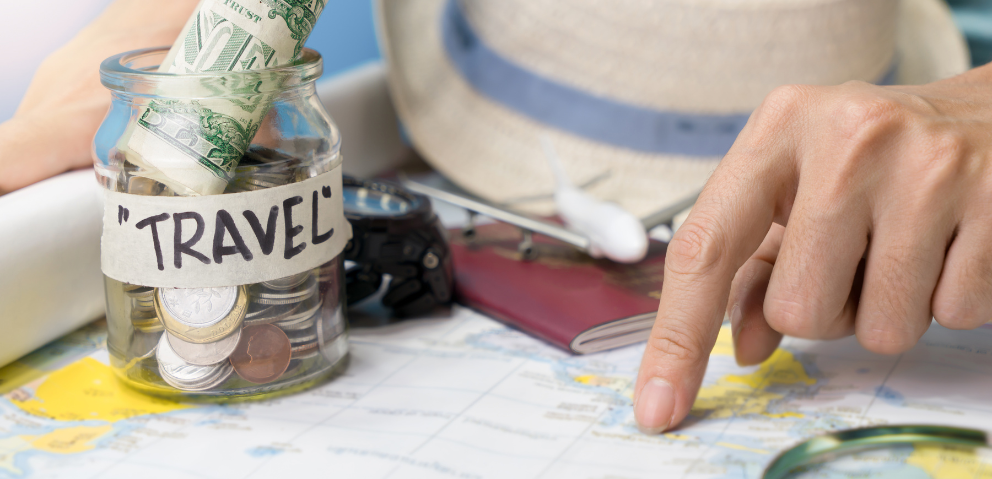Master the Art of Planning: A Beginner's Guide to Budget for a Trip
22 April 2024

Planning for a holiday often feels like an art form; it's not just about selecting the perfect destination but also mastering your holiday budget. With the thrill of choosing flights and discovering new cuisines, it's essential to consider all travel expenses, from fuel costs for road trips to public transportation in new cities. Understanding how to save money for travel and getting a grasp on the average cost of a holiday are crucial steps in ensuring you know how much money you need for travelling.
We'll delve into effective strategies for saving and budgeting that ensure you can enjoy your trip without overspending. Plus, offering tips on boosting your credit rating and creating an emergency fund to prepare you for unexpected costs, helping you make the most of every adventure. From setting up a holiday savings plan to understanding the basics of money management, these strategies are designed to enhance your financial planning for travel.
Determining Your Travel Costs
To effectively determine your travel costs, start by listing all potential expenses associated with your holiday. This includes airfare, accommodation, meals, transportation, and activities.
Utilise tools like the Fuel Economy Trip Calculator for accurate gas cost estimations on road trips, and explore hotel savings sites for budget-friendly accommodations. Don't overlook parking fees at airports and destinations, as well as toll costs using online calculators, ensuring your budgeting covers all bases from flight costs to food budget.
Expense Breakdown:
- Transportation: Calculate round-trip airfare, rental car expenses (using savings sites), and public transportation costs. Include fuel costs using the EPA's calculator and toll expenses. This approach helps in budgeting effectively, ensuring you have a clear understanding of flight costs and car hire expenses, along with travel insurance for a worry-free holiday.
- Accommodation and Meals: Estimate hotel costs and consider daily food expenses—budget approximately £30 per person per day for food. This method of budgeting helps manage accommodation costs and maintain a reasonable food budget, ensuring you know how much money to take on holiday for a comfortable stay.
- Miscellaneous: Add expenses for activities, parking, resort fees, and any travel documents like visas or passports. Utilize tools like MoneyFit.org to cover various trip-related expenses comprehensively, from excursions to travel insurance, ensuring your budgeting is thorough.
By prioritizing and researching each category, you can set a realistic spending limit and adjust your budget as needed, ensuring a well-planned and enjoyable holiday experience. Keep track of all expenses meticulously to avoid any surprises and manage your budget effectively, mastering the art of budgeting and saving for your holiday.
Saving and Budgeting Tips
As we delve into the art of saving and budgeting for your holiday, it's essential to adopt strategies that not only preserve your finances but also enhance your holiday experience without the burden of overspending. Here are practical tips to ensure your holiday budget is both sustainable and sufficient, from creating a saving money plan to finding the best places to save money.
Budgeting and Spending Strategies:
- Create a Detailed Budget: List all expected expenses and assign a specific dollar amount to each. This includes gifts, travel, food, and entertainment. Be realistic about what you can afford and stick to this budget, ensuring your monthly budgeting is on track and manageable.
- Use Technology: Leverage mobile banking apps and budgeting tools to track your spending in real-time. Set up alerts to keep your spending in check, utilising sub-accounts for different expenses to ensure your budgeting efforts are precise and effective.
- Cash Over Cards: To avoid the temptation of overspending, use cash for most transactions. It's easier to track and limits impulse purchases, making it a practical budgeting strategy. Keeping a coin jar for spare change can also help manage variable expenses effectively.
Additional Savings Measures:
- Limit Non-Essential Spending: Cut back on non-essential expenses like dining out and luxury items. Even small savings can add up over time, reflecting prudent budgeting and saving habits.
- Earn and Save: Consider picking up a side job or selling unused items for extra cash. Use any additional income to bolster your holiday fund, integrating budgeting, saving, and the benefits of side hustle or freelance work.
- Rewards Programmes: If you use a credit card, choose one that offers rewards or cash back on purchases, but be sure to pay off the balance each month to avoid interest charges. This strategy aligns with effective budgeting and the smart use of virtual cards.
By implementing these tips, you can enjoy a festive holiday season without the stress of financial strain. Remember, the key is to plan ahead, spend wisely, and cherish the true spirit of the holidays, all while adhering to budgeting and saving money principles.
Utilising Travel Rewards and Discounts
Maximising your holiday budget can be significantly enhanced by effectively utilising travel rewards and discounts. Here's how you can make the most out of various credit card benefits and loyalty programmes, including travel insurance benefits, and by directing savings into a savings account.
Credit Card Rewards and Calculators
- Select the Right Credit Card: Choose cards offering the best benefits like bonus offers, travel rewards, or cash back. Consider cards that align with your spending habits and travel goals, a smart strategy for budgeting, saving, and optimizing your savings account.
- Use Calculators: Employ tools like balance transfer savings calculators or credit card interest rate calculators to manage debts efficiently. Plan purchases around bonus categories to maximise rewards, integrating budgeting and saving strategies into your financial planning. Consider opening a savings account to further enhance your financial management.
Strategic Use of Points and Miles
- Cobranded Cards and Loyalty Programs: For frequent flyers or those loyal to specific hotel brands, cobranded credit cards can be a goldmine. Use these to earn points on everyday purchases, and redeem them for flights, upgrades, or hotel stays, effectively budgeting your travel expenses and saving for future adventures.
- Flexible Travel Credit Cards: These cards provide diverse redemption options from flights to car rentals, often yielding the best value when booking directly through the associated portal. Incorporating such strategies into your budgeting and saving plans can maximize travel benefits.
- Redemption Strategies: Look for sweet-spot redemptions and consider booking during off-peak periods. Utilize the fourth or fifth night free offers from hotel loyalty programs to make the most of your budgeting and saving efforts for travel.
Practical Tips for Maximizing Rewards
- Plan and Book Early: Especially for peak travel times, using points can secure significant savings.
- Be Accommodation-Savvy: Switch from luxury hotels to more budget-friendly accommodations or consider platforms like AirBnB for unique stays. This approach can significantly contribute to your budgeting and saving goals, making travel more accessible.
- Leverage Rewards for High-Value Travel: Use points for business or first-class tickets where they offer higher value, and explore options for extended stays which might offer additional perks. Such strategies are key to effective budgeting and saving for luxury travel experiences.
By integrating these strategies into your travel planning, you can stretch your holiday budget further while enjoying the perks of well-earned rewards. Effective budgeting, saving, and focusing on travel savings can transform your travel experiences.
Emergency Funds and Unexpected Expenses
Building Your Emergency Fund for Unexpected Travel Expenses
An emergency fund is essential, serving as your financial safety net for unforeseen expenses during your travels, such as sudden medical issues, vehicle breakdowns, or even job loss. Here's a structured approach to establish and manage this crucial resource, highlighting where to put savings, budgeting effectively, and setting a savings goal.
Establishing Your Fund
- Assess Your Needs: Estimate the typical costs of unexpected expenses you've encountered before. Aim to save three to six months of living expenses, incorporating this into your monthly budget for a solid saving strategy.
- Set Clear Goals: Begin with achievable targets, like £500, and gradually increase. Include a timeline to motivate your savings efforts, setting a clear savings goal as part of your budgeting plan.
- Open a Dedicated Account: Create a separate savings account labelled as 'Emergency Fund' to avoid temptation.
Funding Strategies
- Automate Savings: Set up automatic transfers to your emergency fund through direct debit or standing order to ensure consistent savings without second thoughts, making budgeting and saving effortless.
- Incremental Increases: As your financial situation improves, progressively increase the amount you save monthly.
- Utilise Windfalls: Direct any unexpected income, such as bonuses or tax refunds, straight into your emergency fund, reinforcing your budgeting and saving strategy.
Usage and Maintenance Guidelines
- Define Emergencies: Clearly outline what constitutes an emergency, sticking strictly to significant unexpected costs.
- Replenish Funds: After any withdrawal, prioritise replenishing the spent amount to maintain the fund's readiness for future needs, ensuring your budgeting and saving efforts remain on track.
- Accessibility: Ensure your fund is easily accessible but consider options that discourage impulsive withdrawals, like a high-yield savings account, to optimise where to put savings while adhering to your budgeting and saving goals.
By adhering to these guidelines, you'll ensure that unexpected expenses don't derail your travel plans or financial stability, fostering good saving habits through diligent budgeting and saving.

